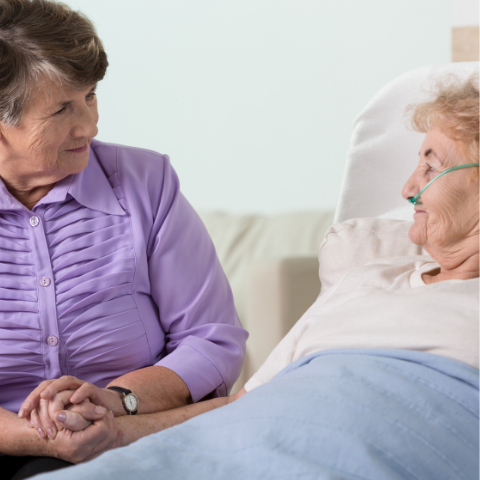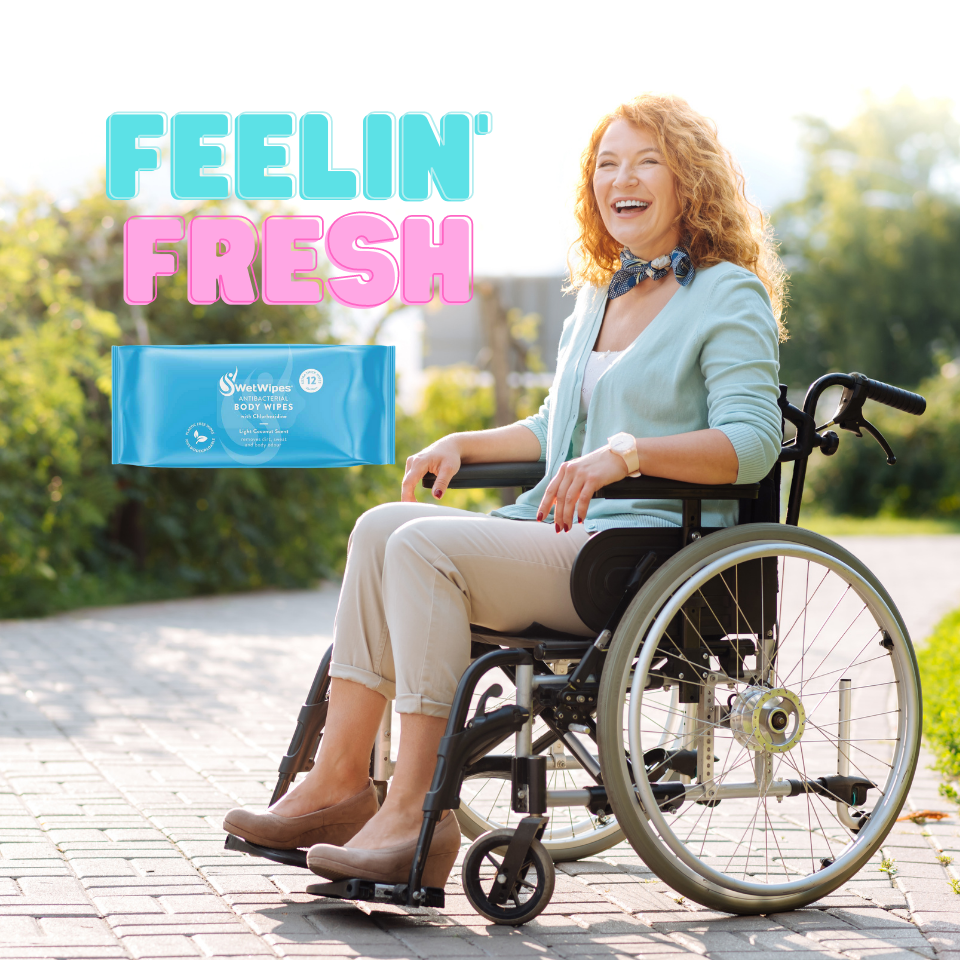If you look after a partner, relative or friend who is disabled due to physical or mental health or you help look after an elderly relative or a partner, you are a carer, even if you don’t think of yourself as one.
It is an unspoken truth that caring for others can be challenging for both you and them. Not only can it be physically tiring, depending on your loved one’s ability to mobilise, but it can be an emotional strain too. However, the more time you spend with them, the stronger your bond will be, and the easier and less stressful it will (hopefully!) become.
One extremely important aspect of assisting a loved one who might have difficulty mobilising or caring for themselves is cleanliness. We all know how important it is for both our physical and mental health that we are able to feel clean and fresh, but for someone with a disability or an elderly relative, this can be an enormous challenge. And that’s why you want to ensure they are able to do this in the most stress-free and dignified way.
This blog post will outline the top five tips for anyone who is caring for a friend or family member who requires assistance in keeping clean.
1 – Maintaining Dignity
The subject of dignity is an extremely important one when it comes to cleanliness, and for a lot of people who are caring for a loved one, it can be the most challenging. A lot of people requiring this assistance have expressed that they have felt shame or embarrassment when their loved one, particularly their child or parent, has to help them in this most intimate activity. That’s why it is extremely important that they are encouraged to do as much as they can themselves. Everyone’s ability will differ, but it is important to encourage your loved one to perform the tasks that they can do for themselves. When it comes to cleanliness, this can be a great place to start, and both parties will benefit from this shared experience. Allowing your loved one their independence in this can make an enormous difference for both of you, particularly when it comes to keeping private areas clean. Allowing them to maintain dignity in this way is vital in assisting them to still feel like “themselves”.
If, however, your loved one is unable to perform such tasks, then you should help them in a way that you both feel comfortable with, for example, allowing them to remain clothed for as long as possible, helping them to cover up the areas that you haven’t yet reached, or that have already been cleaned and ensuring that you are sensitive to other people around you, is the best way to do this.
If you haven’t already tried them, a product like SwetWipes Body Hygiene Wipes can be invaluable as the gentle antibacterial agents will get to work to remove odour-causing bacteria and will allow your loved-one to clean their bodies (including private areas) themselves, perhaps in between your visits or to maintain their dignity whilst you wash other areas.
2 – Keep Them Safe
Safety is the most important aspect of caring for a loved one, and it’s the reason we do care for them. Therefore, especially for those with mobility or balance problems, it is extremely important to ensure their physical safety. You can do this by heulping them to mobilise where they can, ensuring they have somewhere to rest, such as a shower or bath chair, ensuring that the floor is not slippery and that the water is not too hot or cold. Keeping them physically safe also helps to keep them emotionally safe, as they are less likely to worry or dread this activity if they know they will be away from harm.
3 – Keeping them Comfortable
Depending on the amount of help they need, or the facilities they have, might mean that helping them to keep clean can take a longer amount of time, and if your loved one has mobility problems or can’t stand for a long period of time, ensuring they have the ability to sit is extremely important. Having a chair in the bath or shower makes an enormous impact on their physical and mental health during this time, and ensuring they are comfortable is paramount in this.
Everyone has their own preferences; some people don’t like to bath, for example, or may find it difficult to mobilise in or out of the tub. Other people may find showering very frightening, especially if their hair needs to be washed. It is important that you discuss this before you start, and outline the ways in which you will combat each aspect. Some people might prefer to have a ‘bed bath’, or to be brought a bowl of warm soapy water, or some body cleansing wipes, rather than fully immerse themselves in a bath or shower. As long as you both work within your areas of comfort, the process of cleaning and being cleaned can continue to be a pleasant one.
Keeping them comfortable when it comes to dressing them is also extremely important, so helping them to wear loose clothes, or warm socks makes all the difference. It is helpful to let them choose the clothes they wish to wear, and doing so before starting the shower or bathing process can help limit the amount of time they are wet, and potentially getting cold. Again, it is important to encourage them to do as much as they can for themselves, and so handing them their items of clothing one at a time and letting them do what they can, can be extremely helpful.
4 - Maintain their Routine
Everyone has their own routine for cleanliness; some people like to wash when they get up in the morning, others prefer to wash before bed. In maintaining your loved one’s routine, this can also ensure that they feel as comfortable as possible. As well as this, some people have particular brands or products that they like to use, and allowing them to continue with this is extremely important. Ensuring that your loved one is able to use the products and scents they love is a great way to help them to feel fresh and happy, and it also helps them to remain themselves in your mind too: everyone’s relative has their own unique scent, for example, that reminds us of them.
It is also extremely important that their grooming preferences can be maintained too, for example some men like their faces shaved in a particular way, and some women like their hair washed and dried in a particular style. Maintaining this is another extremely important way to keep your loved one feeling like themselves, and helps them to maintain their identity.
5 – Don’t be afraid to ask for help
Caring for a loved one, particularly in this way can be difficult for you too, and therefore it is vital that you do what you can to keep yourself happy and comfortable. It can be difficult, especially at the beginning, to see your loved one in this vulnerable situation. Therefore, if you need some help with this, it is vital that you seek this. There is always someone who can provide this assistance, whether it be from the GP, one of the organisations below or other family members, so please think about yourself too, and seek help where needed. After all, you can’t help your loved one if you can’t function yourself.
Helpful Links:
Below are some charities and organisations who may be able to help provide support (emotional, physical or financial)
Carers UK: Carers UK provide advice and support for all carers, whether they are new to looking after someone or have been a carer for a long time. Their telephone advice and support service is available if you wish to talk to someone about caring, with further information and advice available on the website. www.carersuk.org
Age UK - www.ageuk.org.uk
Disabled Living Foundation: https://www.dlf.org.uk/factsheets/showering-bathing#12
Help the Aged - www.helptheaged.org.uk
NHS UK – https://www.nhs.uk/conditions/social-care-and-support-guide/support-and-benefits-for-carers/
Age International - www.ageinternational.org.uk
Support line - www.supportline.org.uk




Leave a comment
All comments are moderated before being published.
This site is protected by hCaptcha and the hCaptcha Privacy Policy and Terms of Service apply.